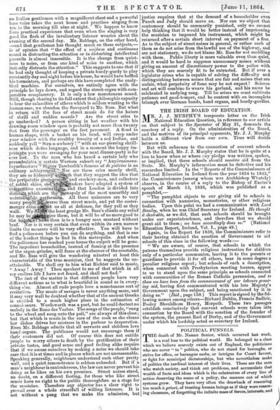THE IRISH BOARD OF EDUCATION.
MR. Y. J. MURPHY'S temperate letter on the Irish National Education Question, in reference to our article on that subject in the Spectator of May 21, demands the courtesy of a reply. On the administration of the Board, and the motives of its principal opponents, Mr. I. J. Murphy holds a different view from our own. Time will decide between us.
But with reference to the connection of convent schools with the Board, Mr. J. J. Murphy states that he is quite at a loss to know when or where ony pledge was written, spoken, or implied, that these schools should receive aid from the State. Mr. Murphy's information must be defective and his researches limited. In the "Reports of the Commissioners of National Education in Ireland from the year 1834 to 1845," the Commissioners (among whom was Archbishop Whately) observe, in the course of a reply to the Bishop of Exeter's speech of March 15, 1836, which was published as a pamphlet,— " The pamphlet objects to our giving aid to schools in connection with nunneries, monasteries, or other religious bodies. Upon this point we had a communication with Lord Stanley, when he was Chief Secretary for Ireland. He thought it desirable, as we did, that such schools should be brought under our superintendence, and therefore that we should grant aid to them ; we have accordingly done so." (National Education Report, Ireland, Vol. I., page 49.) Again, in the Report for 1839, the Commissioners refer to their having obtained the sanction of Government to aid schools of this class in the following words :— " We are aware, of course, that schools in which the patrons themselves provide religious instruction for children only of a particular communion, leaving it to the parents or guardians to provide it for all others, bear in some degree a peculiar religious aspect; but schools of such a description, when connected with Presbyterian meeting houses, appear to us to stand upon the same principle as schools connected with communities of the Roman Catholic persuasion, and to these we have been from the commencement of our labours grant- ing aid, having first communicated with his late Majesty's Government upon the subject, and being sanctioned by it in doing so." (Ibid., page 150.) This report is signed by the fol- lowing names among others—Richard Dublin, Francis Sa.dleir, Pooley Shouldham Henry, Morpeth. These two passages establish conclusively that convent schools were taken into connection by the Board with the sanction of the founder of the system, the present Earl of Derby, and of the Government under which his lordship acted as secretary for Ireland.




























 Previous page
Previous page